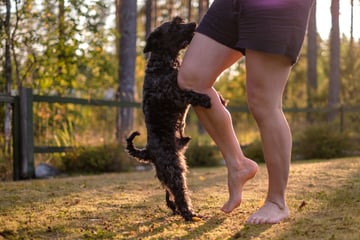How to stop a dog from biting its leash
All dog lovers enjoy taking their pooches for long, pleasant walks. But there's nothing pleasant about a dog relentlessly snapping and tugging on its leash every time you go out. So why do dogs bite the leash and what can you do about it?
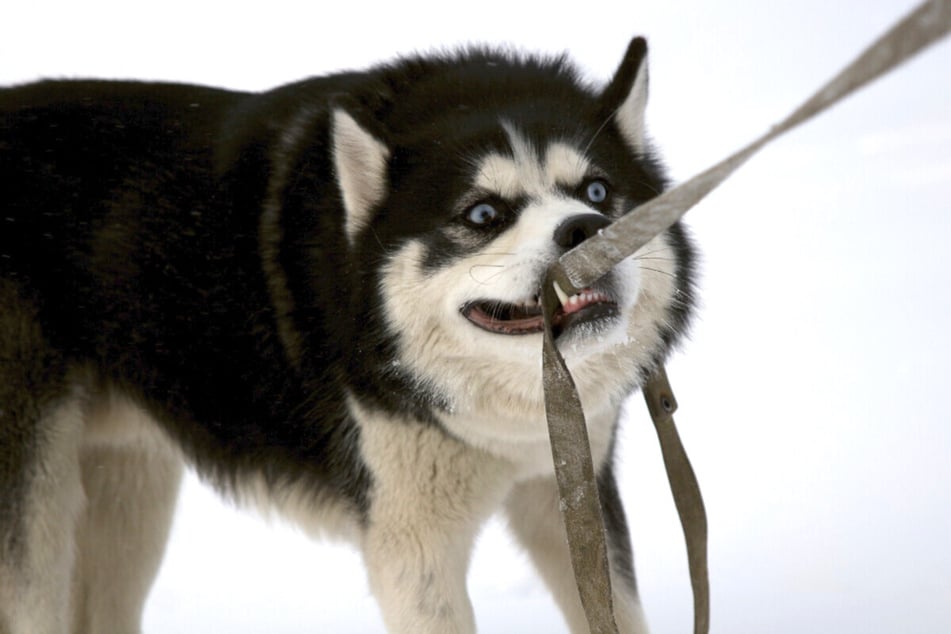
We've all been there. Your dog just won't stop chowing down on the leash and is more interested in playing tug of war than in just moving. This kind of behavior can cost you a lot of energy and time to deal with, and can even be dangerous in certain situations. So how can you stop a dog from biting its leash?
The first step to fixing the problem is understanding why it happens in the first place. The TAG24 dog guide will help you explore why your dog insists on biting its leash, as well as a collection of tips and tricks on how to appropriately train and stop your dog from chewing the leash.
It only takes a few simple tweaks to make your doggy strolls nice and relaxing again!
Why is my dog chewing on the leash?
There's always an explanation for a dog's behavior, whether good or bad. Let's first try to diagnose the issue.
Here are a few possible reasons for a dog chewing on its leash:
- Attention
- Learned behavior as a puppy that was never trained away
- Stress, fear, or excitement
- Desire to communicate
- Playfulness
- Boredom or frustration
- Leash tightness
Your dog's habit of biting the leash is unlikely to be a display of dominance, leadership, or aggression. If it isn't addressed, though, it can start to develop in that direction, especially if it's indicative of a lack of boundaries.
Before deciding on your strategy for stopping your dog from biting the leash, think about why it may be doing it. Focus on the things that happen before, during, and after this behavior.
Please note: Remember to keep your dog's leash relatively loose, as dog owners will put their dogs on high alert when the leash is tightened.
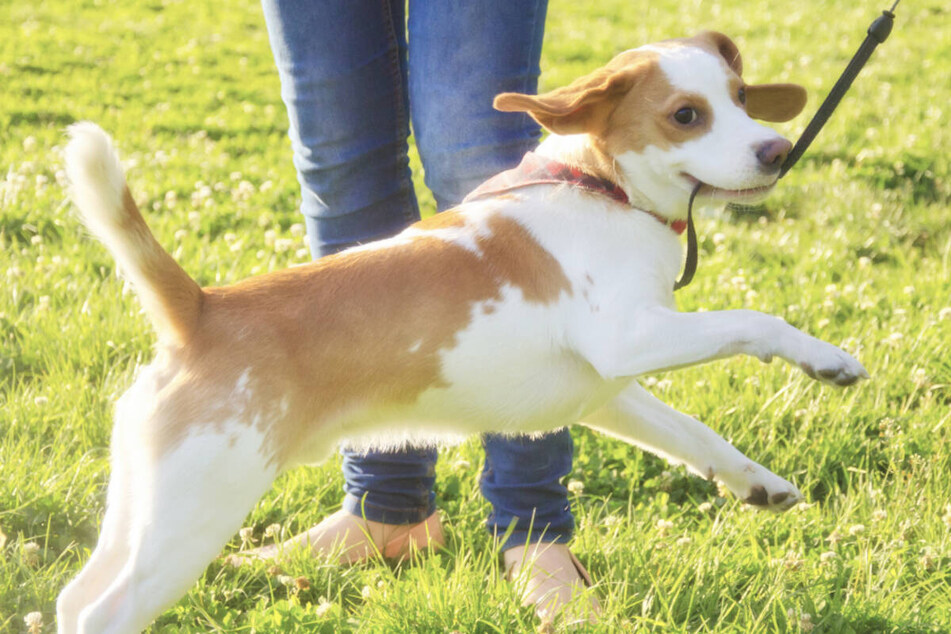
Get the right collar to avoid dogs biting the leash
You need to make sure that the leash and collar has been put on properly, as one of the main reasons for your pooch's poor behavior could be discomfort. That means guaranteeing that the collar is not too tight and does not constrict the neck in any way.
Remember to regularly check your dog's neck for redness, rashes, or general irritation. As a rule of thumb, the collar should be as wide as the dog's neck, with two fingers worth of space.
Not all of these poor pooches are the same, and each dog will have its own leash preference. If you want to stop a dog from biting the leash, first experiment with a few collars and find one that they like.
How to stop dog from biting the leash
When your dog bites the leash, you may be tempted to yank the leash angrily out of its mouth and give it a good talking to. This kind of reaction, however, is extremely unhelpful, and may actually be interpreted as encouragement.
Instead, here are a few ways to safely and effectively stop a dog from biting the leash:
1. Tell it "NO"
One of the most important commands a dog needs to understand is simply "No". A well-trained pooch knows it as a prompt to immediately stop what it's doing. Make sure you're loud and firm, but also calm.
Always interrupt your dog by clearly saying "No" every time it tries to bite the leash. Eventually, it will learn that this kind of behavior is not allowed.
2. Drop the leash
Whenever you want to stop your dog biting the leash while walking, simply drop the least and stand on it, which makes sure that your canine companion can't run away. This display of disappointment might be enough to stop your dog.
Hot tip: In a safer area, such as in a training center or fenced-off dog park, you can think about simply dropping the leash and walking away. This sends a clear signal that you want the dog to quit its behavior.
3. Ignore the unwanted behavior
Whatever you do, never let your dog gain your attention by biting the leash. The silent treatment goes a long way with dogs.
If, on the other hand, you start tugging on the leash, or react in some other way, it will have achieved its goal of getting your attention, which would make it a worthwhile activity for the dog. Instead, stop, ignore the dog, and take a look at your phone for a little bit.
4. Offer the dog a different activity
If a simple walk is becoming a bit boring for your doggo, it may think of entertaining itself by biting on the leash. If this happens, try to think of something else you can do to change things up. Maybe consider taking a different route to the one you usually take, or playing a few games with it in the park.
Small tasks, games, and changes in pace can help to make the dog feel challenged, exercising its brain capacity and keeping it both mentally and physically healthy. Of course, consider the dog's age, size, and breed, but don't be afraid of giving it a little challenge.
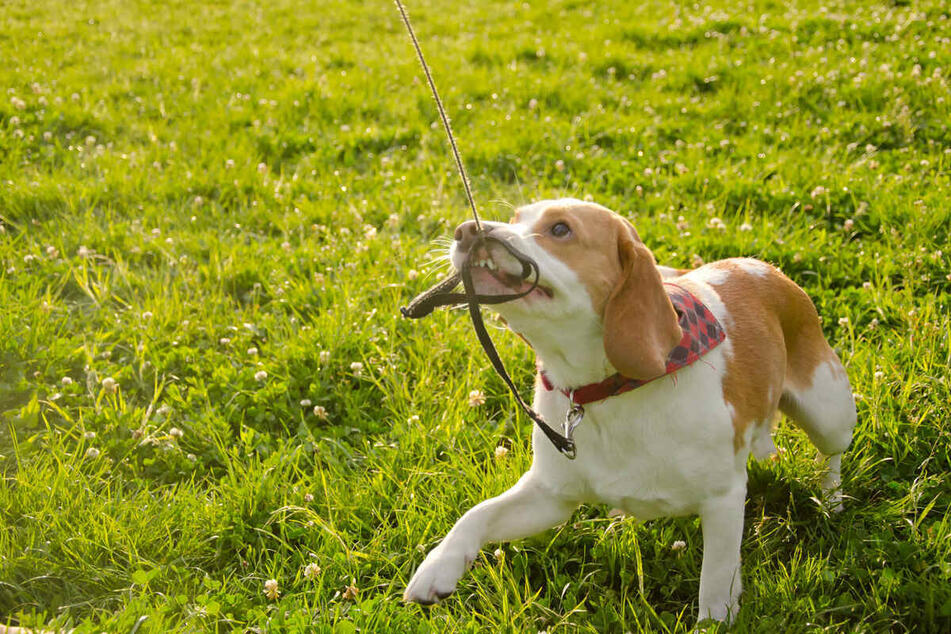
5. Distract your dog with toys and sticks
If your dog forgets about the leash, it will likely stop biting it. To do this, use toys and sticks to distract the dog and give it something else to focus on. You can't get rid of the leash – it's necessary for safety – but you can reduce its importance.
Try giving it a chew toy, a teddy bear, or something else to bite on whilst it walks around. Do not offer these alternatives immediately after biting, though, as this will encourage it to bite the leash as a way of getting a toy.
6. Use other aids
Instead of using toys or a stick, you can use a different walking aid to stop a dog from biting the leash. Consult your veterinarian for suggestions that would be particularly good for your dog, but a better collar or even a harness could help a lot.
If biting becomes a really serious problem and starts to seem aggressive, then it's time for a muzzle. This can be helpful in training as well, but is less than ideal.
7. Get help and training
To make sure that you truly understand your dog's behavior and react accordingly. Some professional training in a dog school or with an instructor will always come in handy. This way you can get the advice of a professional, improve the behavior of your doggo and help to stop it from biting the leash all in one go.
Remember that you need to be very patient when trying to stop your dog from biting the leash. Be consistent and calm, making sure that your pooch understands that it ain't cool and that you don't appreciate the behavior.
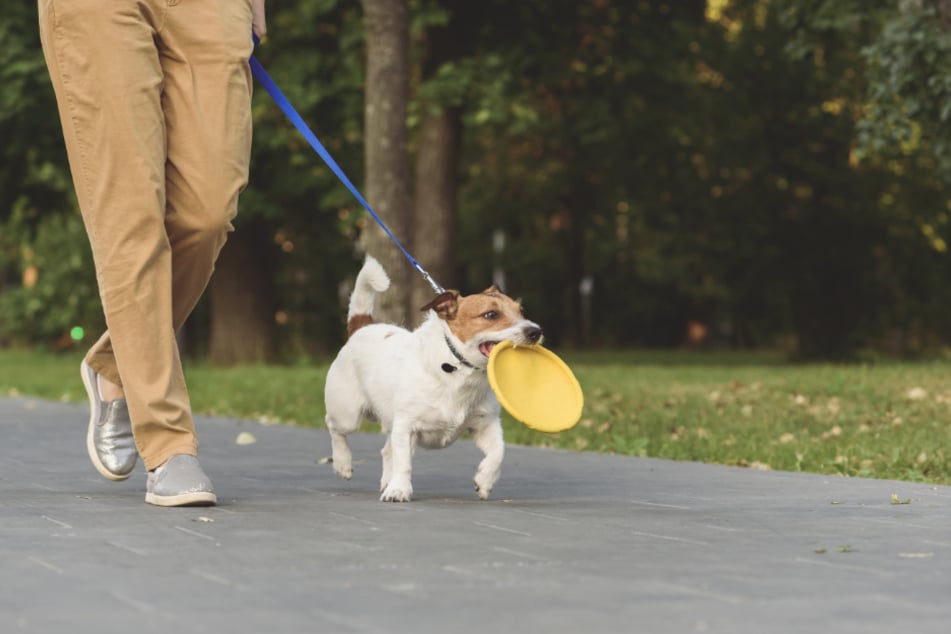
How to stop puppy from biting leash
Young dogs do what they want and what they enjoy. They're playful pooches and will want to use their leash as a toy. Ideally, you should addressed any unwanted behavior early.
The key is not letting it turn into a game for the puppy, who may pull on the leash to elicit a response from their human. Keep in mind, though, that inexperienced puppies may also bite and pull on the leash as a sign of stress and fear, or even teething.
Make sure to take the steps we described above to train your puppy out of biting and pulling on its leash. You don't want the issue to remain, so get it to understand "No" and don't reward it for this bad behavior.
Here are some tips to help discourage your puppy from biting the leash whilst walking:
- Walk at an appropriate pace (so not too fast).
- Make sure your walks are regular, but not too long.
- Stay relaxed and chill.
- Take regular breaks.
- Make the walks exciting and let your pup sniff and search its surroundings.
- Do not keep the leash too tight.
- Make sure to positively reinforce good behavior.
- Never use the leash as a toy.
- Make sure that your dog sets its own pace.
- Have patience.
Being patient with your puppy is key if you want to encourage it to stop biting the leash. It can take a good long time before it will learn, and that's okay. Just show it love, affection, and positive reinforcement.
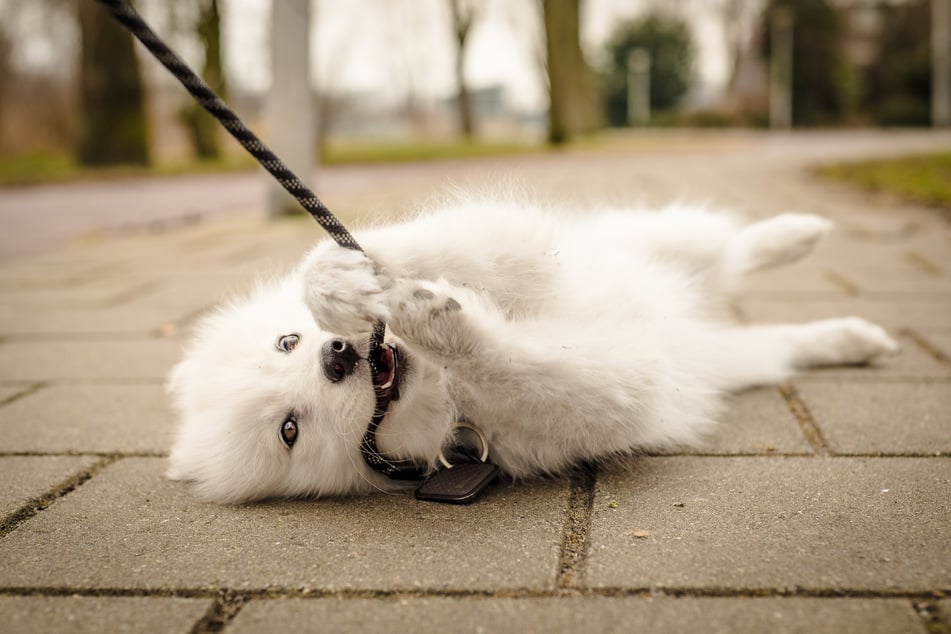
How not to deal with dogs biting the leash
There are a few reactions that should be avoided if your dog continuously bites the leash. Some things will not only fail to achieve the desired result, but will actually worsen the problem and cause genuine harm.
Here are a few things to avoid doing when a dog is biting the leash:- Hitting the dog, or punish it in some way or another
- Yelling at the dog
- Tugging at the leash too harshly
- Keeping the leash tight and short
- Offering your dog a treat immediately after it behaves badly
- Avoiding walks altogether
- Using a metal leash with chain links
- Smearing spicy sauce on the leash
You might achieve some short term successes with the solutions described above, but in the long run, you're likely to cause serious harm to the pooch and cause more behavioral problems. Not to mention, some of them are just plain cruel.
My dog chewed through its leash again...
We're sure that you know the pain – you've gone for a lovely walk and next thing you know, your already worn-out leash has been bitten through. Off you go chasing your cheeky canine,
Your dog is clearly having plenty of fun, which makes the whole situation that little bit more exasperating. But don't worry, with a little bit of training you will get your dog to stop biting its leash in no time at all!
Cover photo: 123RF/anykeen

